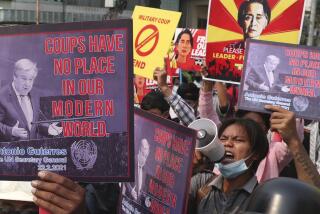Thai police botch attempt to capture protest leader
- Share via
Reporting from Bangkok, Thailand — Thai police bungled the attempted capture Friday of an anti-government “Red Shirt” protest leader who was shown on television escaping from his hotel hide-out using a rope ladder to the cheers of supporters.
Authorities had hoped the detention of Arisman Pongruangrong, 46, a pop crooner-turned-political- hard-liner, would blunt the group’s momentum. Instead, their failed effort may have further emboldened the Red Shirts, so named for their clothing and paraphernalia.
After the botched raid, Prime Minister Abhisit Vejjajiva assigned the chief army commander to take over from a deputy prime minister the job of restoring order as the protesters press to topple the government.
Abhisit, in a speech carried by all TV stations, said Gen. Anupong Paochinda would take charge of the peacekeeping force.
“A decision has been made to make the command line more effective and swifter,” Abhisit said, according to news reports.
Thai police reportedly said that two high-ranking officers were taken hostage by protesters during the escape.
Throughout the protesters’ monthlong bid to topple the government, Arisman has been variously described as a provocateur, enforcer, go-to guy and loose cannon.
Despite a declared state of emergency in Bangkok, the capital, and orders to disperse, hundreds of Red Shirts remain camped out in the city.
In the showdown, the movement of self-proclaimed “commoners” is counting on support from rank-and-file police and soldiers to blunt any further crackdown or the ordered arrest of its leaders.
“The police are of the people,” said Wasaporn Jankieaw, a 20-year-old student clad head-to-toe in red. “They can’t bear to bring us harm.”
The latest speculation in Bangkok as the standoff drags on and the rumors fly is that a closed-door meeting of high-ranking generals to be held Monday could lead to a further tightening of security.
Thailand’s military is not above interfering in politics, most recently in a 2006 coup that ousted then-Prime Minister Thaksin Shinawatra. Thaksin, named in several corruption charges, is idolized by many of the protesters for his social welfare policies and is believed to be funding the movement from self-imposed exile.
The Red Shirts, who have been occupying one of Bangkok’s glitziest intersections, are buoyed by having fought off an army crackdown last weekend.
Hundreds of protesters took soldiers hostage, seized assault rifles and dismantled six armored personnel carriers, which they subsequently painted with populist slogans such as “Soldiers, you are children of these villagers.”
But that showdown came at a price, with 24 people killed, including protesters, a journalist and security personnel, and about 900 injured, making it Bangkok’s worst political violence in nearly two decades.
Arisman had helped ramp up tension before the deadly clash with a series of provocative stunts, including a brief invasion of parliament and the dumping of human blood, donated by protesters, around the prime minister’s compound.
Other protest leaders have tried to temper Arisman’s extremism, Red Shirt spokesman Sean Boonpracong said last month in an interview. “He’s our friend, but we’ve had to take him to the woodshed,” Boonpracong said. “We keep an eye on these guys.”
The extended political crisis has hurt business and prompted neighboring countries to call for reconciliation. Thailand’s tourism industry has lost an estimated $310 million in the last month, according to an industry trade group.
Winn is a special correspondent.
More to Read
Sign up for Essential California
The most important California stories and recommendations in your inbox every morning.
You may occasionally receive promotional content from the Los Angeles Times.













